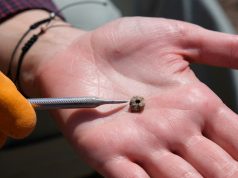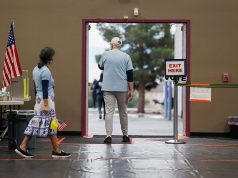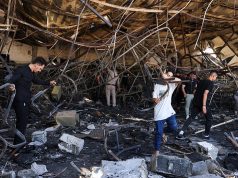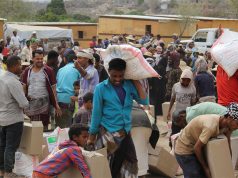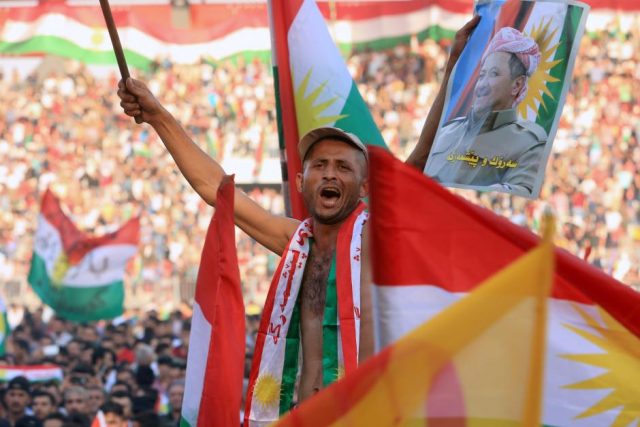
ERBIL/KIRKUK, Iraq — The United States and Western allies pressed Iraqi Kurdish leaders to ditch a “very risky” independence vote on Thursday, presenting an alternative plan in an attempt to avoid conflict between the oil rich region and central government in Baghdad.
The referendum, slated for September 25, has become a potential flashpoint in the region, with Western powers concerned it could ignite conflict with Baghdad and divert attention from the war against Islamic State militants.
“Heading into a referendum for September 25, there is no prospect for international legitimacy,” Brett McGurk, a U.S. special envoy, told reporters after a delegation also including the U.N. and Britain met Kurdish President Massoud Barzani.
“This is a very risky process.”
McGurk said he was encouraged that Kurdish leaders could embrace an alternative plan focusing on dialogue between the Kurdistan region and Baghdad and a delay in the referendum. He refused to give details.
The Kurdish presidency said the autonomous region’s political leaders would study the proposal, without giving details.
But Barzani himself was later quoted by local media as telling a pro-independence rally the vote would go ahead on September 25 as planned.
The move came after Iraq’s parliament voted to remove the governor of Kirkuk, a staunch supporter of Kurdish independence.
Kirkuk Governor Najmaddin Kareem said he had no intention of following Baghdad’s dismissal order, issued at the behest of Prime Minister Haider al-Abadi.
“I will stay in office,” he told Reuters. “The referendum will go on as planned …The prime minister does not have the power to ask parliament to remove me.”
Iraqi lawmakers authorized Abadi this week to “take all measures” to preserve national unity before the independence referendum.
Baghdad and Iraq’s neighbors are opposed to the vote.
Iraqi lawmakers say it will consolidate Kurdish control over several disputed areas, including oil-rich Kirkuk.
Turkey has the region’s largest Kurdish population and fears a “Yes” vote could fuel separatism in its southeast where Kurdish militants have waged an insurgency for three decades in which more than 40,000 people have been killed.
Iran and Syria also oppose the vote, fearing it could fan separatism among their own Kurdish populations.
Kirkuk
Iraqi lawmakers say the referendum will consolidate Kurdish control over several disputed areas, including oil-rich Kirkuk.
Kirkuk province is claimed by both the central government in Baghdad and Barzani’s semi-autonomous Kurdish region in northern Iraq.
Kareem is a vocal supporter of the referendum and campaigned for the vote also to be held in Kirkuk.
Kurds have long claimed Kirkuk and its huge oil reserves. They regard the city, just outside their Kurdistan region in northern Iraq, as their historical capital.
But the ethnically mixed city also has Arab and Turkmen populations.
Kareem has long riled the federal government. Last spring, Kirkuk’s governorate voted to raise the Kurdish flag over state buildings, despite Baghdad’s insistence that only Iraq’s national flag should fly in the multi-ethnic city.
“He (Kareem) is an elected governor of the council of Kirkuk,” said Hoshyar Zebari, a close adviser to President Barzani. “That is the only body that can remove him.”
“The escalating tactics this week by the Iraqis are causing a large public backlash, and will strengthen the Kurdish referendum enormously,” Zebari said.
Kurdish MPs in Iraq’s parliament boycotted Thursday’s vote, which produced a majority for the governor’s removal, lawmaker Husham al-Suhail told Reuters.
Asked whether parliament had the right to dismiss Kareem, Suhail referred to an article of Iraq’s provincial law, which parliament used as the legal basis for the vote and which stipulates the prime minister’s authority to remove a regional governor.
Suhail gave no details about what Kareem was accused of and Kareem himself said he had not been informed.
“This is unlawful … I have the support of the government council, I have the support of the people, we are here and we will continue,” he said.





